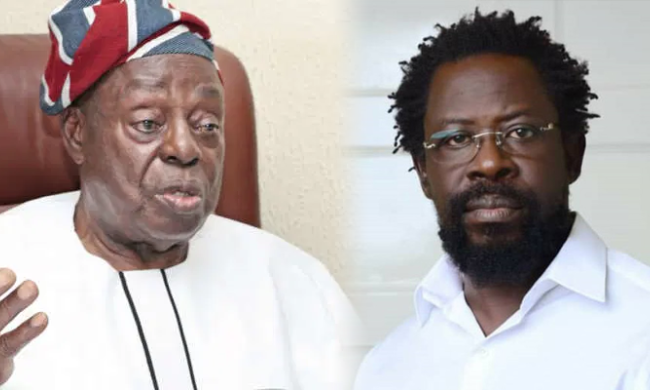Human rights lawyer, Dele Farotimi, was denied bail today by a magistrate court in Lagos.
Farotimi is facing a 16-count charge of alleged defamation brought against him by prominent Senior Advocate of Nigeria (SAN), Afe Babalola.
The charges stem from statements Farotimi reportedly made that were deemed defamatory to Babalola’s character.
During the court session, which was closely watched by many, the magistrate ordered that Farotimi remain in the custody of the Nigeria Correctional Service.
Farotimi arrived at the court in the morning, escorted by officers from the Rapid Response Squad and the Nigeria Correctional Service.
He was seen entering the court premises at approximately 9:49 AM on Tuesday, December 10.
The case has generated considerable public interest, with many wondering about the implications for freedom of speech and the treatment of human rights defenders in the country.
In his defense, Farotimi has denied the allegations of defamation.
His legal team argued that the charges were politically motivated and intended to silence his outspoken criticism of the government.
Despite the defense’s arguments, the magistrate ruled that Farotimi would remain in custody until the next hearing date on December 20, 2024.
The decision has sparked reactions from various human rights groups, who have raised concerns about the fairness of the trial.
One human rights advocate, speaking on condition of anonymity, said: “This is a worrying trend. It appears that critics of the government are increasingly being targeted through the legal system.”
Farotimi’s supporters also expressed frustration with the ruling.
One of his close allies, who attended the court proceedings, said: “We are disappointed by the court’s decision to deny bail. Dele Farotimi is a man of integrity and courage. This is an attack on justice and free speech.”
The case has also drawn attention from legal experts and activists, who are monitoring it closely.
Some observers argue that the charges against Farotimi could set a dangerous precedent for other critics of powerful individuals in Nigeria.
A lawyer familiar with the case stated: “The legal community is watching. This case is more than about Farotimi; it is about the right to free expression in Nigeria.”
While the defamation charges remain the center of the case, the political context surrounding it cannot be ignored.
Farotimi is well known for his vocal criticism of government policies and his defense of human rights.
In recent years, he has emerged as a leading figure in Nigeria’s civil rights movement, challenging government abuses and calling for reforms.
His outspokenness has earned him both praise and criticism. Some view him as a defender of the public good, while others believe his rhetoric crosses the line into defamation and personal attacks.
For now, the focus remains on the court case.
The next hearing, scheduled for December 20, 2024, will be crucial in determining Farotimi’s fate.
If convicted, Farotimi could face significant penalties.
The outcome of the case may also have wider implications for other activists and critics of the government in Nigeria.
As the legal battle continues, Dele Farotimi’s supporters are already planning protests and public demonstrations to express solidarity with him.
They argue that the case is an attempt to intimidate those who speak out against powerful individuals and institutions in the country.
In the meantime, Farotimi will remain in detention, awaiting the next phase of his legal journey.

